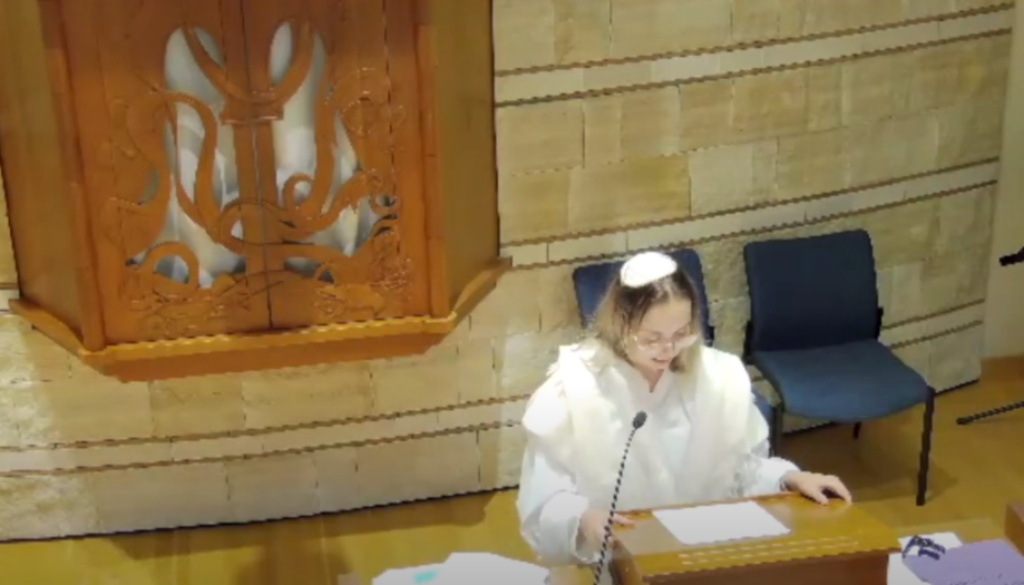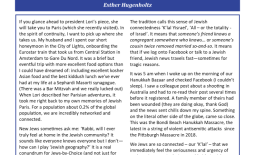Erev Yom Kippur Sermon 5784
I sat nervously in his office, among his many books, facing his cluttered, working desk. It was my first time in a rabbinic office and although not a nervous person by nature, my stomach was tied up in knots. I had been joyfully practicing Judaism for a few years and had intensified my practice after interning a summer at a Jewish Renewal retreat center in upstate New York.
I took pride in the observance I had built: I made my own challah, celebrated Shabbat with my friends, attended services, bought a tallit for home use and davened in the mornings most days. I had purged treyf from my diet and kept a vegetarian kitchen. My own collection of Jewish books was growing quickly. As the Talmud phrases it, my life was becoming enveloped in the ‘four cubits of Jewish sacred practice.’ I experienced such happiness in my journey. Now it was time for me to make it official.
The rabbi looked at me solemnly. But I knew in my heart of hearts that my future belonged with this people and their God and I proudly shared everything Jewish I was doing.
‘I don’t care’, was the resolute retort, ‘whether you light Shabbat candles or not, or how many mitzvahs you keep.’
‘If you do not have a Jewish bloodline, you are not welcome here.’
My innards snapped themselves tightly around my hurt. Pain, rejection, anger, rage—all these coiled around my soul. I stammered to rebut: I knew enough of the tradition and the rights of converts, but my words faltered, like empty shells clattering onto the floor. At that moment, I felt like my life and its every possibility, the alignment of my deepest self, was pulled away from me. I felt the gate slam shut.
Twenty years on, it is hard for me to share this story. It is one of many hard stories around my entry into the Jewish people. I have encountered welcome and kindness, cruelty and rejection.
It is a messy and complicated picture, intersecting with Europe’s post-Holocaust trauma, the state of the Jewish world in the early 2000’s, and my own stubborn unwillingness to take ‘no’ for an answer. I have carried these stories in my heart for two decades and sought to extract from them best rabbinic practice around welcoming: the welcoming of all, whether Jewish or potentially Jewish, because I know what it is like to have the door closed in my face.
There is a myth circulating in the Jewish community that the convert needs to be turned away three times. This is based on a midrash in Midrash Ruth Rabbah where the Rabbis interpret Naomi’s turning away of Ruth as a paradoxical practice. To put it in Talmudic language, ‘to draw close the convert with one hand and push away with the other.’
This midrash is contextual to the Ruth story, where Naomi wants to protect her daughter-in-law from the inevitable pain of leaving her familiar life and surroundings behind. With the rise of the Christianized Roman empire, welcoming converts became a capital crime under Church law, for both the proselyte and the person converting them. Whereas early rabbinic Judaism had previously extended a warm welcome to those who seek to join us, its zeal for welcome and inclusion was tamped down in order to preserve our people’s safety and guarantee our survival.
I still encounter this myth of turning-people-away-three times in my rabbinic practice. Seekers approach me tentatively and nervously, perhaps expecting to experience what I had experienced those decades ago. ‘Aren’t you supposed to turn me away three times?’ they ask.
I tell them that this is based on only one midrash and has not been liberal rabbinic practice in decades, as rabbis like Alexander Schindler, President of the Union of American Hebrew Congregations (the forerunner of the Union of Reform Judaism) already in the 1980’s were opening doors. Both the Reform and Conservative movements are clear: we welcome seekers.
As rabbis, we make sure to set seekers on a wise, thoughtful, compassionate and rigorous process of spiritual discernment so they have the freedom to figure out, with full consent, whether Judaism is the right choice for them. There is no pressure; only welcome. As it says in Talmud Sanhedrin[1] ‘The righteous of the nations have a share in the world to come.’
After students complete a year-long class, rabbinic mentoring and integration into our community, we are thrilled to welcome our new Jews to experience the joy of membership and full participation in our synagogue.
Let me be clear: I am not sharing this to posthumously shame the rabbi. His one encounter with me surely doesn’t speak to his full range of gifts and practices. He was operating in a very specific context, at a very specific historical juncture in post-war Netherlands.
I do not agree with, justify or defend his actions. I can, however, extend rachmones – compassion – and let it temper my pain as I reflect on the trauma inflicted on the Jewish community I sought to enter. It is a complicated, messy picture, because it is a complicated, messy life, and Yom Kippur is the moment in the year for us to hold complicated, messy truths.
I share my story because tonight is the time for all of us to contemplate our vulnerabilities.
How do we give voice to our experiences – including the experiences where others have hurt us – while being even-handed and fair? This applies to so many difficult and broken relationships in our lives: marriages and divorces, parental relationships, neighborhood spats, workplace conflicts. I would wager to guess that most of us – if not all of us – struggle with this very dilemma.
We have hurt others and others have hurt us. As we take stock of our relationships, we also take stock of how we have fallen short or transgressed against others. It seems deeply paradoxical, but our ability to do so on Yom Kippur makes it an intensely joyful day. Transmuted out of the pain is growth. Out of trauma comes transformation – there is a psychological concept known as post-traumatic growth which the Rabbis seem to understand. Filling our soul-cracks with the warm gold of our Torah, returning us to our immutable Jewish joy.
The commandment that is repeated 36 times in the Torah, for us to ‘love the stranger for we were strangers in Egypt’ comes out of this mission. To transform trauma into radical empathy. To love and embrace those who are most vulnerable in our midst, who belong to marginalized groups in our community. Behind this teaching lies a subtle but steely optimism: we can change. We can become better, more compassionate and more ethical human beings. We can repair and be repaired.
Do I think of what happened to me as a transgression against me and perhaps others seeking to become Jewish in the decades following World War Two ? In some ways I do. But this is the starting point, not the ending point.
My response has been to shape a rabbinate of welcome: a welcome that is precious and needed, and which is in line with the Reform, Reconstructionist and Conservative movements today. The support and sensitivity we show toward the newcomer is not just paradigmatic of our ethics as a community, but it actually helps us to become a better community.
You do not need to be a convert to feel vulnerable or scared of showing up at a synagogue. Many born Jews don’t read Hebrew or understand the liturgy. There are many unaffiliated Jews in our area that I would love to proactively welcome into our community. Some of them may have a story too. Maybe some of you do! Maybe there have been times where you – sitting here tonight – felt like Judaism was too intellectual or scary, too intimidating or unwelcoming, even though it was your birthright and yours to claim all along.
But be assured: Our covenant is not a zero-sum game. We don’t run out of Judaism if we share it more. We learn and grow from our diversity: it is core to who we are.
Beneath the solemnity of my message, there rests a great and abiding hope. Jewish joy – the joy we seek to share – is an accountable joy. We hold ourselves accountable these twenty-five hours – in collective public ways and in private, personal ways only known to our own hearts – for where we have fallen short.
But t’shuvah – repentance – is perhaps the world’s greatest invention. The Rabbis speculated that t’shuvah was one of the first things God created; so instrumental is it to our world and to who we are called to be as Jews. Rabbi Jonathan Sacks wrote – and I know I quoted him last year, but this is too good to deprive you – that ‘repentance introduces into the human equation the unpredictability of grace.’
We are entering a long, twenty-five hour journey today, a ‘yeridah l’shem aliyah’, a ‘descent for the sake of an ascent.’ We will be sitting with the al chet’s and the ashamnu’s and how they call to our lives.
I know I will be reflecting on my own shortcomings, my own pain and anger, my stubbornness and impatience. But the magic and meaning of holy community is that we get to experience the catharsis together, held by each other, in love and trust, and as the ‘yoma arichta’, as this long day grows, in increasing joy.
To say ‘yes’ to a profound and compassionate tradition; to be welcomed in and embraced, to know that the gates of our community are open and there is a place for each of us, just like the Gates of Heaven, the Gates of Prayer, and the Gates of Repentance are never to be closed.
May we be blessed with quiet moments of reflection, the liberation of our tears, the reckoning of our hurts and the growth of our souls. May we root ourselves in this precious, ancient path and find in it a deepness and a gentleness that will carry us through the vicissitudes of our lives.
As we move to build such holy community over the next 25 hours, may we emerge cleansed, purified, joy-filled and confident.
May we feel moved to welcome the stranger and embrace each other as we seek to repair and perfect our world.
Wishing all of us rachmanut, compassion, and an ever-expansive sense of who we are and all we are called to be.
Ashreinu u’mah tov chelkeinu – how fortunate are we and how good our portion.
U’mah na’im goraleinu – and how pleasant our destiny.
[1] Tosefta Sanhedrin 13




